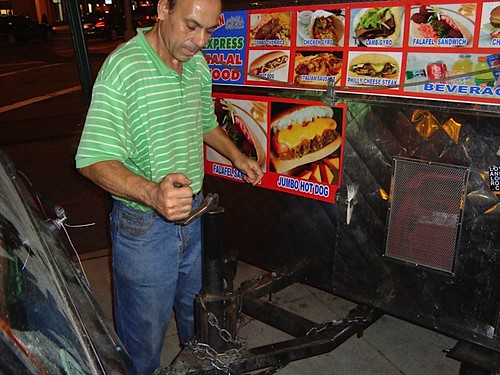When Said Abdel Moneim’s 1992 Jeep broke down last week by Union Square while towing a roadside food stand to its overnight parking lot, it took him five hours to figure out a way to bring both trucks back to Astoria, Queens. In a heartwrenching spectacle, Mr. Abdel Moneim, 71, slid under his car and desperately shuffled around engine parts with the help of Nasser Magdy, the food vendor responsible for the stand. When the car did not budge, both men, stranded outside the comfort of their Arabic-speaking neighborhood, were at loss over what to do.
It is a scene emblematic of the simple, yet paralyzing, challenges thousands of immigrants face in their struggle to build a home away from home. The struggle is not unique to any one ethnicity, but the Astoria neighborhood, better known as Little Egypt, brings to light the staggering difference between becoming a citizen on paper and feeling like one at heart.
“I am American, but I feel like a stranger here,” Mr. Abdel Moneim said as he sat idly in his immobile car. The roof sagged, the seats were soiled, the radio had been dislodged and Arabic audiotapes, like relics of the past, fell out of the glove compartment. Mr. Abdel Moneim, a retired army officer back in Egypt, immigrated with his wife and two daughters 14 years ago through the U.S. Diversity Visa Program.
The program, established in 1996, was designed to extend immigration opportunities to natives of underrepresented ethnic groups in the United States. With the exception of about a dozen countries, which already bring in a high influx of immigrants, millions of applicants from virtually every country in the world enter a lottery and up to 55,000 winners are granted U.S. Green Cards each year. According to statistics released by the U.S. Department of State, from 2005 to 2010, a total of 20,790 Egyptian nationals were granted immigrant visas through this program. At this rate, Egyptians constitute one of the three largest groups of diversity immigrants flowing to the United States in recent years. But this promising chance, grounded in an inherently American affinity for diversity, is often clouded by the complicated reality surrounding some of those immigrants’ failure to integrate.
Mr. Magdy, 48, was transported, overnight, from Egypt’s rural countryside to New York’s throbbing city life. As a middle school teacher in Egypt, he earned the equivalent of $160 a month. He entered the Green Card Lottery, as the program is also referred to, for 12 consecutive years until he finally won his permanent residence in 2009. Once in the United States, it did not take long for Mr. Magdy to face the grim reality of his lonely existence.
“I don’t know if I can survive this much longer, it is like being locked up, I suffer on my own and every day is exactly the same,” he said, in an interview that was conducted in Arabic. “If I say I am American when I can not speak a word of English, then I would be lying to myself.”
Mr. Magdy wants to study English, but he works 12-hour shifts, six days a week preparing and selling food at a halal stand in Manhattan. He makes about $1600 a month, half of which he sends to his wife and two children in Egypt. He acknowledges that this money has improved his family’s life. “But at the cost of my mental wellbeing,” he adds with a tone of resignation.
In Little Egypt, about a dozen hookah lounges infuse the air with the smell of fruit-flavored tobacco. Weekend nights are busy as hundreds of local residents try to reincarnate the spirit of home with back-to-back backgammon tournaments that last through the early hours of the morning. But, as many openly admit, those are transient moments that fail to foster any meaningful sense of community, one where people go out of their way for one another.
“These enclaves are partial societies, they are an attempt to create a feeling or social world, but they fail over time,” said Andrew Shryock, professor of anthropology at Michigan University and co-author of “Arab Detroit: From Margin to Mainstream”. “They’re transition zones, where America eases into the community and the community eases into America.”
For many Egyptian-Americans, like Mr. Magdy and Mr. Abdel Moneim, this translates into a purely material relationship with a country whose fortunes they admire but struggle to enjoy.
It was midnight. Mr. Abdel Moneim went through a long list of phone contacts until Atef Atwah agreed to make the trip to Union Square and save him – for $50. Mr. Atwah, who, like Mr. Abdel Moneim, is licensed to haul food carts, towed Mr. Magdy’s stand to Astoria then came back for Mr. Abdel Moneim. He hooked the battered Jeep to the back of his car using an old rope and let it trail behind. Without any steering power, the broken car jolted down the street and Mr. Abdel Moneim finally found a moment to laugh at himself.
“We do things that Americans don’t do,” he said.

